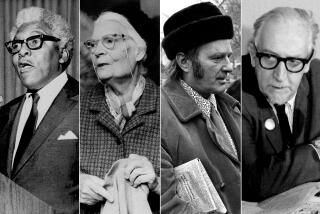Proponent of Pragmatism : Sidney Hook; Noted U.S. Philosopher
- Share via
Sidney Hook, considered by many to be America’s leading philosopher of pragmatism and at the least one of the most influential thinkers of the 20th Century, has died of congestive heart failure at the age of 86.
The philosopher, author and educator, who had been a controversial figure in American intellectual circles since the late 1920s, died at Stanford University Hospital on Wednesday.
Since 1973, he had been a senior research fellow at the Hoover Institution on War, Revolution and Peace at Stanford. He took the position after his retirement from New York University where he had taught since 1927 and served as chairman of the philosophy department until 1968.
Hook almost always challenged accepted ideas and refused to substitute passion for logic in arguing a case.
Key Belief
He wrote in his autobiography that his key belief was that “the central problem of our time is . . . the defense and enrichment of a free and open society against totalitarianism.”
In a 1987 review of his autobiography, “Out Of Step: An Unquiet Life in the 20th Century,” Time magazine wrote: “To ‘30s conservatives, he seemed a Marxist apologist; to ‘60s New Leftists, he was a cold warrior . . . (but) the only group to whom Hook paid strict allegiance was the party of one.”
Hook became a leading proponent of philosopher John Dewey’s ideals, known as pragmatism, a peculiarly American philosophy that an idea must be judged by how it works rather than by how it looks. Under the philosophy, an idea may be true under certain circumstances but false under others.
Hook first became known as a secular humanist, and his first book, “The Metaphysics of Pragmatism,” published in 1927, was an exposition of Dewey’s thought.
Hook became an international figure in 1933 upon publication of “Towards the Understanding of Karl Marx,” which was viewed as a sympathetic interpretation of ideas of the philosophical founder of Marxist-Communism.
Hook tried to integrate Marxism with the pragmatist philosophy expounded by William James and Dewey. His book, “From Hegel to Marx: Studies in the Intellectual Development of Karl Marx,” published in 1936, is a scholastic classic, considered one of the best critical expositions of Marxism ever made by an American philosopher.
But Hook never joined the Communist Party and rejected the idea that the attainment of socialism or a planned economy could or should be accomplished by sacrificing democratic ideals and institutions. He was one of the first outspoken opponents of Soviet communism under Joseph Stalin.
He founded the Committee for Cultural Freedom in 1939, an organization of more than 200 intellectuals opposed to Stalinist repression. The same year, he became a full professor in the philosophy department of NYU, despite demands for his ouster by some of the nation’s press.
The Hearst newspaper organization particularly regarded him as a communist although the Communist Party itself called him a renegade and even a “fascist.”
Hook’s best-known work, “The Hero in History,” published in 1943, is still widely used in college classrooms.
Hook also founded in 1951 the American Committee for Cultural Freedom and was an early critic of Sen. Joseph R. McCarthy (R-Wis.)
Hook expounded his views on issues of that era in two books, one titled, “Heresy Yes--Conspiracy, No.!”
Despite the furor his Marxist views had generated over the years, in 1985 he was awarded the Presidential Medal of Freedom, one of this country’s highest honors.
More to Read
Sign up for our Book Club newsletter
Get the latest news, events and more from the Los Angeles Times Book Club, and help us get L.A. reading and talking.
You may occasionally receive promotional content from the Los Angeles Times.








